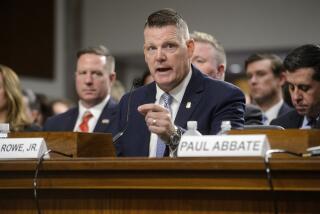Obama introduces revamped national security team
President Obama formally announced the shakeup of his national security team, installing a trusted insider as his new Pentagon chief and appointing new leadership to guide the transition to a smaller American military presence in the difficult war in Afghanistan.
At a ceremony in the East Room of the White House on Thursday, Obama introduced his four nominees for vital military and diplomatic roles at a time of reduced budgets and fierce challenges to American interests overseas.
There were no surprises in the afternoon event; the White House had confirmed the changes the day before. But in brief remarks, Obama and the nominees gave insights into their thinking about the challenges facing the Pentagon, intelligence gathering services and the Afghanistan war effort.
Leon Panetta, now the CIA director, will replace Robert Gates as Defense secretary. Gates was a holdover from the George W. Bush presidency whom Obama credited with winding down the war in Iraq.
Four-star Gen. David H. Petraeus, commander of military forces in Afghanistan, will retire from duty and succeed Panetta at the CIA. Gen. John Allen will take over for Petraeus in Afghanistan, and veteran diplomat Ryan Crocker is to replace the outgoing U.S. ambassador to Afghanistan, Karl Eikenberry.
All four nominees face Senate confirmation.
Standing at a lectern with the four men lined up to his left, Obama said all were uniquely suited to the new assignments.
“Given the pivotal period that we’re entering, I felt that it was absolutely critical that we had this team in place so that we can stay focused on our missions, maintain our momentum and keep our nation secure,” Obama said.
One of Panetta’s tasks will be finding $400 billion in cuts to the military budget. Under pressure to tame the nation’s large deficit, Obama has pledged to reduce it by $4 trillion over the next 12 years. He is counting on deep reductions in Pentagon spending to make the numbers work. Gates had been skeptical about additional cuts in defense. But Panetta, who served as budget director under President Clinton, is expected to be a more compliant partner in finding new savings.
Obama said that “as a former OMB [Office of Management and Budget] director, he’ll ensure that even as we make tough budget decisions, we’ll maintain our military superiority and keep our military the very best in the world,” Obama said.
Petraeus, who will stay on the job until September, hinted at the complexities of the decade-old conflict in Afghanistan. In July, the U.S. will begin troop withdrawals that are part of a gradual hand-off in which responsibility for defeating Al Qaeda and rolling back the Taliban falls to the Afghan government.
In his remarks, Petraeus said he feels “guarded optimism about the trajectory of the mission ….”
A key requirement for the reshuffled team is for all players to get along. That hasn’t always been the case. A leaked cable ratcheted up tensions between Eikenberry and Afghan President Hamid Karzai, whose cooperation is considered vital to the next phase of the war. NATO plans to end combat operations in Afghanistan by 2014, at which point the Afghans would be fully in charge of their own security.
Though he heaped praise on Gates, Obama has tussled privately with members of the military leadership, who seem more beholden to a robust troop presence in Afghanistan.
In Panetta, Obama will have a defense chief who may prove more sensitive to the White House’s political interests.
“This is going to be an outstanding team,” the president said.
peter.nicholas@latimes.com
More to Read
Get the L.A. Times Politics newsletter
Deeply reported insights into legislation, politics and policy from Sacramento, Washington and beyond. In your inbox three times per week.
You may occasionally receive promotional content from the Los Angeles Times.










